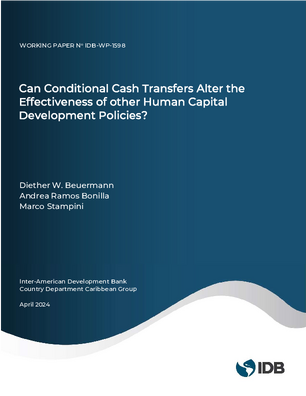Can Conditional Cash Transfers Alter the Effectiveness of Other Human Capital Development Policies?
Date
Apr 2024
Covering the full population of applicants to the Jamaican Conditional Cash Transfer Program (PATH), we explore whether receiving PATH since childhood altered the academic gains from attending a more preferred public secondary school. To uncover causal associations, we implement a double regression discontinuity design motivated by both the PATH eligibility criteria and the centralized allocation process to public secondary schools. Among girls, receiving PATH benefits did not influence the academic gains from attending a preferred school. However, boys exposed to PATH experienced significantly lower gains from preferred school attendance with respect to comparable peers who did not receive PATH. These results highlight the relevance of considering both the direct effects of conditional cash transfers and the potential indirect effects that such policies could convey through altering the effectiveness of other related policies.
Generative AI enabled





